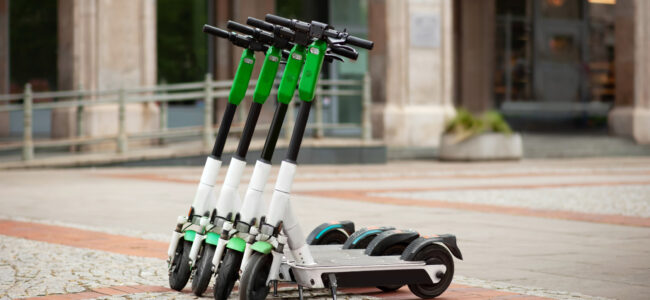BlogLine
New Jersey Supreme Court rules that E-scooter riders are not eligible for PIP benefits under auto policies
9/12/24

In Goyco v. Progressive Insurance Company, 257 N.J. 313 (2024), the New Jersey Supreme Court was called upon to decide whether the operator of a low-speed electric scooter (LSES) is entitled to personal injury protection (PIP) benefits under the New Jersey Automobile Reparation Reform Act, N.J.S.A. 39:6A-1 to -35, commonly known as the No-Fault Act.
On November 22, 2021, an automobile struck and injured David Goyco while he was operating a “Segway Ninebot KickScooter Max” in Elizabeth, New Jersey. The “Segway Ninebot KickScooter Max” is an LSES that has two wheels connected by a floorboard, as well as handlebars, a headlight, brake light, and speedometer. Pursuant to its owner’s manual, the LSES is designed to be operated using its rechargeable battery, which powers its electric motor.
Goyco sustained injuries from the accident and incurred medical expenses. At the time of the accident, he was the named insured under a personal automobile policy with Progressive. He reported the accident and made a claim for PIP benefits under the policy, which provided that the insured could receive PIP benefits for injuries sustained in an accident “1. While occupying, entering into, alighting from, getting on, getting off of, loading, unloading, or using an automobile; or 2. As a pedestrian, caused by an automobile or by an object propelled by or from an automobile.” Progressive denied Goyco’s claim for PIP benefits, concluding that the LSES Goyco operated at the time of the accident did not meet the definition of an “automobile,” and Goyco could not be considered a “pedestrian” because he was “driving” the LSES at the time of the accident.
Goyco filed a Verified Complaint and an Order to Show Cause, requesting the trial court to direct Progressive to pay all reasonable medical expenses incurred to treat his injuries. Goyco asserted that an LSES is akin to a bicycle pursuant to N.J.S.A. 39:4-14.16(g) and that, under New Jersey case law, bicycle riders are considered “pedestrians” within the meaning of the No-Fault Act. He further argued that an LSES is akin to a bicycle, and therefore he was a “pedestrian” for purposes of PIP benefits. In its opposition, Progressive argued that an LSES was not an “automobile” under the No-Fault Act and Goyco did not qualify as a “pedestrian” because the LSES was motorized.
The trial court determined that an LSES was not an automobile under the statute or the policy. In addition, the court concluded that Goyco could not rely on N.J.S.A. 39:4-14.16(g) to support the contention that an LSES is like a bicycle for purposes of PIP benefits because that provision is not part of the No-Fault Act. The trial court further noted that the No-Fault Act contains no mention of “bicycles,” and any reference to bicycles in N.J.S.A. 39:4-14.16(g) or any other provisions of Chapter 4 has no impact on Chapter 6A, which “houses” the No-Fault Act. Finally, the trial court determined that “[t]he plain language and nature of the definition of a ‘pedestrian’ in accordance with [the No-Fault Act] clearly has no application to an [LSES].” The trial court thus denied relief to Goyco.
Goyco appealed, and the Appellate Division affirmed the trial court’s judgment. The Appellate Division found that Goyco was not a “pedestrian” within the plain language of the No-Fault Act because an LSES is a “vehicle propelled by other than muscular power” that meets the definition of a “[l]ow-speed electric scooter” in N.J.S.A. 39:1-1. The Appellate Division also rejected the argument that N.J.S.A. 39:4-14.16(g) likens an LSES operator to a bicyclist. Relying on the text of N.J.S.A. 39:4-14.16(g), the Appellate Division held that the statute’s exception overcame Goyco’s argument: “all statutes … rules, and regulations applicable to bicycles … shall apply to [an LSES] except those provisions which by their very nature may have no application to … [an LSES].”
On appeal, the New Jersey Supreme Court affirmed the Appellate Division’s conclusion that Goyco was not entitled to PIP benefits because he was not a pedestrian pursuant to N.J.S.A. 39:6A-2(h). The Court explained that it reached this decision by relying “on the plain language of the No-Fault Act and the ordinary meanings of the undefined terms it uses…” The Court found that Goyco’s LSES was a “vehicle” that uses a rechargeable electric motor and was therefore “propelled by other than muscular power” and was “designed for use on highways, rails and tracks.” The Court stated that “the plain text and legislative history of N.J.S.A. 39:4-14.16 do not suggest that the Legislature intended LSES riders to be considered pedestrians for purposes of the No-Fault Act.” By contrast, the text of the No-Fault Act and its legislative history suggest that LSES riders are not considered “pedestrians” for purposes of PIP benefits. As a result, and because there is no argument that the policy at issue here provides coverage beyond the statutory requirements, the Court held that Goyco was not a pedestrian entitled to PIP benefits under Progressive’s No-Fault insurance policy.
The Supreme Court’s ruling in Goyco will have considerable impact upon operators of e-scooters who are injured in a motor vehicle accident as they will not be entitled to PIP benefits under New Jersey’s No-Fault Act. However, as Justice Solomon wrote in the Court’s decision, ““The Legislature may certainly choose to expand the availability of PIP coverage to LSES operators, as they did with motorcycles …, but that policy decision and its insurance cost implications, if any, is properly for the Legislature, not the Court.”
For further information or inquiries, please contact Edward Solensky Jr. at edward.solensky@fmglaw.com or your local FMG attorney.
Share
Save Print
